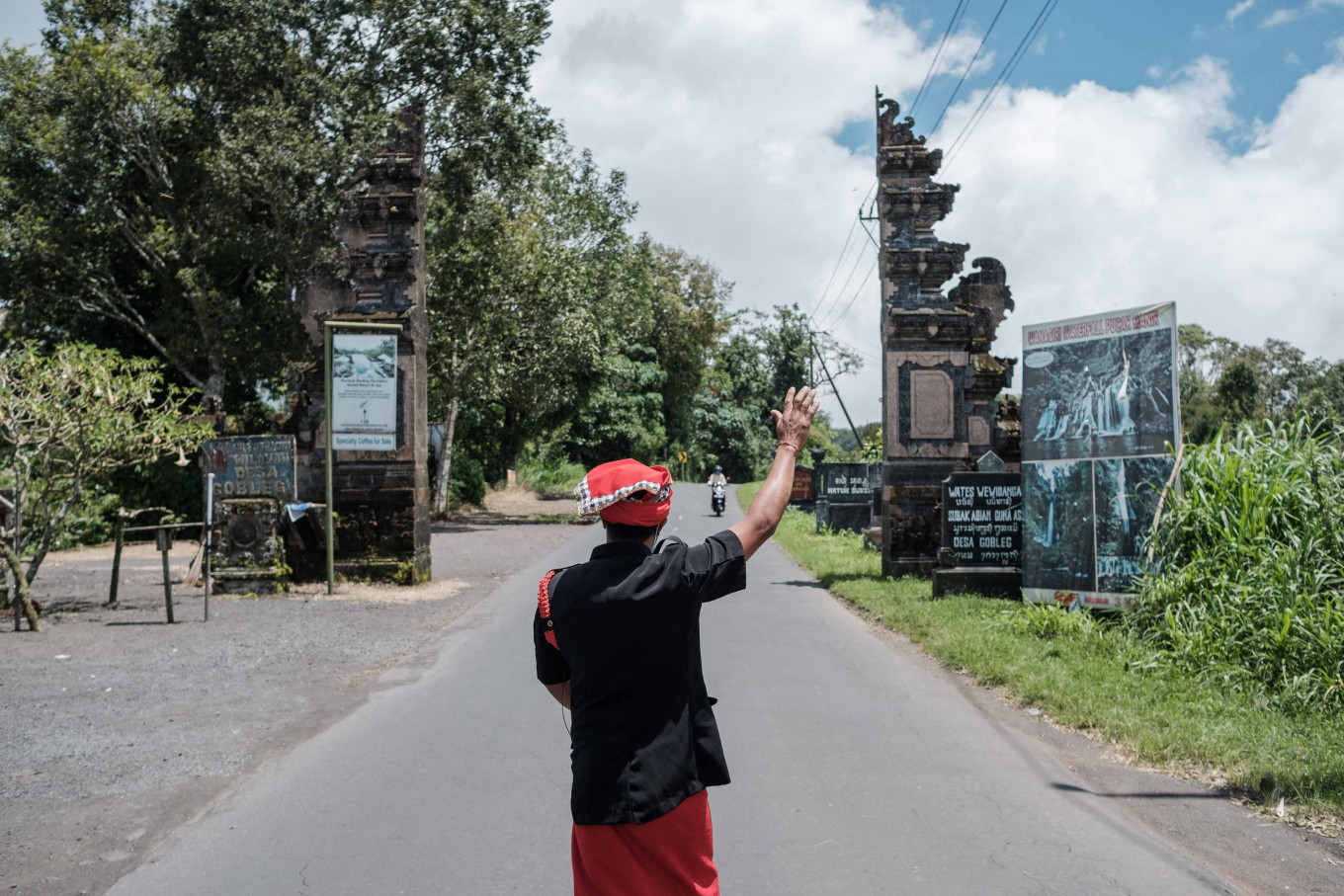Popular Reads
Top Results
Can't find what you're looking for?
View all search resultsPopular Reads
Top Results
Can't find what you're looking for?
View all search resultsFeeling stuck in lockdown? What I learned from Day of Silence in Bali
Day of Silence in Bali is an opportunity to observe nature in a new way, and it has prepared some people for the social distancing in place around the globe right now.
Change text size
Gift Premium Articles
to Anyone
O
n March 23, following Australian Prime Minister Scott Morrison's decision to close the doors of cafes, restaurants and public libraries, 22 of us lost our jobs in a matter of minutes as event, venue and cafe staff at The Bryan Brown Theatre and Knowledge Centre in Bankstown, a suburb to the southwest of Sydney. Along with 21 other casual staff, I woke up unemployed the following day. The only option I've got is to seek help from the government to claim the so-called "job keeper" allowance. It is degrading at a mature, independent age like myself to be on “the dole” again.
I was the last person working on the evening shift on March 24. It was quite eerie to see the building looming in the dark. Usually, bright LED lights would illuminate the library and I could see glossy interiors of modern bookshelves and desks behind the immense glass wall from a distance. But on that night, all the lights were off.
Winter is approaching down under. This year, autumn gives us mild sunshine and some days of rain while the harsh summer is still in our vivid memories. I was walking down a few blocks from the station to my workplace bracing for the heat and smoky air. We haven't seen clear blue skies for weeks. Bush fires had left black, skeletal trees in our neighborhood bushland.
It was only 8:30 p.m., but the streets were empty with just a few people walking from the nearby Bankstown station. I was walking down the empty street. Usually, on chilled autumn nights I would stop for a while to watch the boys playing soccer. But now the Paul Keating Park was dark; its benches were empty. I turned around, looking at the knowledge center and library building where I had worked for the past two years. Usually I could see locals sitting at the library desks or teens passing by bookshelves, but that night the entire building was completely dark.
Who would have thought that, after the bush-fire disaster ended, we would be walking in dark, empty streets? Self-isolation and quarantine are the words we hear, and possibly we are still adjusting our lives to this new world. The unforeseen, unfortunate events of life are playing us down.
Day of Silence: Bali’s annual 24-hour lockdown
Three years ago, in March 2017, I traveled solo to Bali, only to find myself with no other option but to self-isolate in a tiny villa in the middle of a tropical jungle in Ubud. I had to follow the traditional island law: self-isolation for 24 hours out of respect for the Balinese Nyepi (Day of Silence). With social-distancing and self-isolation happening all over the world, Nyepi has never been more relevant. But what can we learn from the Hindu Nyepi?
My Balinese friends mark their lunar Saka New Year by isolating themselves for 24 hours. This year, Nyepi started at 6 a.m. on March 25 and ended at the same time the next day.
This annual Hindu celebration is a public holiday for the archipelago of Indonesia. It has been a celebration to mark the island's Saka New Year since 79 AD. For 24 hours, the Balinese have to obey a regime of self-isolation with certain restrictions in place: only low lights are allowed and no business or working activity is permitted, including any form of entertainment and traveling.
My Balinese friend Wayan warned me on WhatsApp when he found out that my travel dates coincided with Nyepi. "The local security will be patrolling, and you will be in trouble if they see you breaching any of the restrictions," he added.
Nyepi is enforced for everyone on the island, including travelers. Twenty-four hours of self-isolation in Bali are a meditative day of self-reflection. Though the actual Nyepi ritual is elaborate, the four restrictions are applied for individuals as a way of meditation. What we see now in many cities around the world is what happens in Bali on Nyepi.
Beaches are deserted while streets are left empty. Airports, shops and offices are closed. On a silent day, I only heard dogs barking in an empty street while coconut trees danced with the wind. Mother nature was so close that I almost felt like it was wrapping its hands around me. In the deep, dark jungle of Ubud, trees crawled onto the horizon as the dark sky revealed the trembling stars. In the night, I heard a symphonic orchestra of river streams between rocks. Crickets chirped as an owl was hooting before scooping a frog down the dark water of rice fields.
The silent day opens a way to observe nature through different senses. "Our ears listen and our eyes see differently," said Kung, my Balinese Hindu mentor, who guided me prior to Nyepi. "We see and hear the world differently, and most importantly, we see ourselves differently. It is a meditative moment of self-reflection."
During this self-isolation, it is time to reflect on what I have done and what I haven't. I started doing something I never completed before. My gym routines have shifted to yoga and meditation. I started reading the book I never got the chance to read. I made a to-do list, and I can't believe there are so many things I can do at home. I want to encourage myself to write and read more. I have many watch lists on Netflix and Foxtel for entertainment. Cleaning the house has never been a priority, but now I do it every day. Decluttering is my new norm.
The uncharted territory of self-isolation
Stricter social distancing is now in place. We are advised to go out only for essential activities, such as to go to work, grocery shopping, health services or haircuts (with distance restrictions in the barbershop/hair salon and no more than 30-minute appointments). The law forbids social gatherings, including visiting neighbors, relatives or family members. More businesses are forced to shut down. Restaurants and cafes are only allowed to offer takeouts.
We want to believe humanity is the belief system that empowers us all. A pandemic isn't a test for us, but it is a fact we have to face and defeat in every possible way by following the authorities' orders. Let's put aside any differences and doubt as we all want our lives back on track again.
Indeed, we are not built for self-isolation, but in the challenging times of our lives we could be grateful that some of us had the opportunity to travel to different parts of the world. From traveling, we get to learn something out of our charted territory. We meet new people, adjust to new ways of living and adapt to new environments. Life is a lesson we learn through each second of traveling. (wng)
***
An Australian-Indonesian travel writer based in Sydney. Proud owner of blog www.doodyrichards.com







